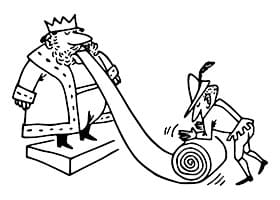 The adjective servile , derived from the Latin word servīlis , allows us to describe what is linked to servants . A serf, meanwhile, is a slave , an individual subject to a feudal lord or a subject who is totally subordinated to something or someone .
The adjective servile , derived from the Latin word servīlis , allows us to describe what is linked to servants . A serf, meanwhile, is a slave , an individual subject to a feudal lord or a subject who is totally subordinated to something or someone .
The idea of servile, therefore, is usually used with reference to someone who submits to a person's authority without question or objection . The term is used in a pejorative or negative way, since it is considered that someone who is servile is low and unworthy.
For example: "I have no respect for him as a journalist, he seems to me to be a servile communicator who limits himself to repeating what the rulers say" , "The opposition accused the chancellor of being servile and of favoring the interests of foreign powers instead of the nationals" , "The population is at the mercy of servile judges who always rule in favor of the powerful" .
It is important to mention that the notion of servile is not only used to classify human beings, but also refers to attitudes , expressions, activities, etc.: "I am irritated by the servile obedience of workers who do not assert their rights against to the arrogance of their bosses" , "The servile support of several opposition deputies was key for the government to be able to impose its controversial project" , "Many analysts criticized the president's servile position at the summit" .
He who is servile, in short, does not question the orders of his superiors or object to the instructions of those who hold any type of power or authority.
Before continuing, we must mention the noun from the family of servile , servilism , which is defined as the condition of one who is servile. Let's say that we could reformulate several of the previous examples using this term instead of a noun plus the servile adjective: "the servility of the workers irritates me," "they criticized the servility of the president."
 It is clear that the word servile does not have any positive meaning. In fact, in addition to the synonyms mentioned so far, we could add sycophant , submissive, bootlicker and timid , among others that refer to a lack of respect for one's own person in favor of complying with the instructions or will of a third party.
It is clear that the word servile does not have any positive meaning. In fact, in addition to the synonyms mentioned so far, we could add sycophant , submissive, bootlicker and timid , among others that refer to a lack of respect for one's own person in favor of complying with the instructions or will of a third party.
Another way of interpreting this adjective, although also negative, is as the attitude of someone who is helpful and humble to an exaggerated level with the purpose of obtaining some benefit from their superiors. Although we could affirm that the double intention is present in all cases, perhaps the subject is not always aware of expecting something in return, since many are servile simply for not knowing how to act in a dignified manner.
In summary, the attitude of servility is one of the most criticized because it shows a very poor relationship with oneself, the absence of self-love and approval of another person's decisions and actions beyond their characteristics. In many cases we could say that it is a kind of slavery that is not imposed , but rather chosen by the slave himself.
If the negative consequences of a servile way of acting only impacted those who exhibit it, perhaps the concept would not be very worrying on a social level. However, in certain situations they can reach third parties who think in the opposite way and condition their lives unfairly . For example, every time someone accepts an abusive attitude from an employer, it negatively affects the situation of the market in which they are immersed. Whether it is harmful treatment, the absence of a formal contract or a salary that is too low, keeping quiet about frustration for fear of losing your job makes it more difficult for others to complain.
